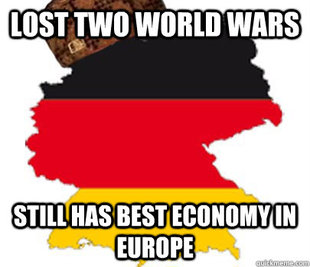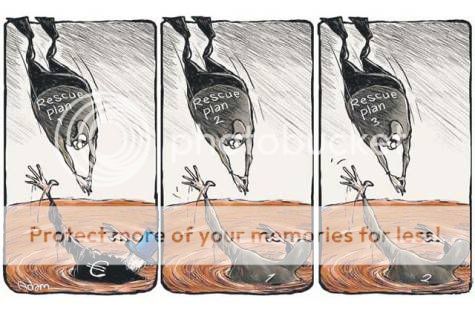TechMan
FULL MEMBER

- Joined
- Jan 24, 2008
- Messages
- 771
- Reaction score
- 0
UPDATE 1-Poland appeals to Germany to save Europe | Reuters
WARSAW, Nov 29 (Reuters) - Europe stands on the brink of disaster and only Germany, its biggest economy, can avert an "apocalyptic" breakup of the euro zone and the EU's single market, Poland's foreign minister said in a dramatic appeal to Berlin.
"There is nothing inevitable about Europe's decline. But we are standing on the edge of a precipice. This is the scariest moment of my ministerial life but therefore also the most sublime," Radoslaw Sikorski said in Berlin on Monday evening.
"I demand of Germany that, for your own sake and for ours, you help it (the euro zone) survive and prosper. You know full well that nobody else can do it."
Alluding to his country's troubled past ties with its bigger, richer western neighbour, Sikorski said: "I will probably be the first Polish foreign minister in history to say so but here it is: I fear German power less than I am beginning to fear German inactivity".
Sikorski said the euro zone's sovereign debt crisis posed the biggest threat to the prosperity and stability of Poland, the EU's largest post-communist member state which is outside the common currency but still hopes one day to join.
In an opinion piece in the Financial Times echoing aspects of his Berlin speech, Sikorski wrote: "The break up of the eurozone would be a crisis of apocalyptic proportions, going beyond our financial system".
The EU's single market would be unlikely to survive such a trauma, he said.
GERMAN CONCERNS
Sikorski did not spell out what Poland wanted Germany to do, but Polish officials have in the past expressed support for euro bonds jointly guaranteed by euro zone nations.
Berlin has also come under heavy international pressure to allow the European Central Bank to embark on unrestricted purchases of stricken euro zone countries' sovereign debt through quantitative easing.
Germany has so far strongly opposed both eurobonds and a more active role for the ECB, citing fears that indebted countries would no longer have an incentive to reform their economies, as well as concerns about reigniting inflation.
Euro zone finance ministers were due to agree on Tuesday the details of bolstering their bailout fund to help prevent contagion in bond markets.
In his speech, Sikorski supported calls for much closer economic integration in the EU, including greater supervisory powers over national budgets for the European Commission, the bloc's executive arm, but said sensitive issues such as taxation should remain under the control of member states.
"The draconian powers to supervise national budgets should be wielded only by agreement of the European Parliament," he added, underscoring Warsaw's reservations about handing too much power over core policy areas to the unelected Commission.
The British-educated Sikorski was re-confirmed as foreign minister this month after Prime Minister Donald Tusk's centre-right, pro-euro government won an Oct. 9 election.
The Tusk government, which currently holds the EU's rotating presidency, has forged good ties with Germany, Poland's biggest trade partner, since taking power in 2007.
The leader of Poland's main opposition party, the right-wing, eurosceptic Law and Justice party, sharply criticised Sikorski's Berlin speech, accusing the government of surrendering the country's hard-won independence.
"In the past many Poles perished fighting for precisely those things that the government representatives are giving away without a word of protest," said Jaroslaw Kaczynski in a statement.
He also criticised Tusk for not recognising that the tendency for big European powers, especially Germany and France, to take decisions on behalf of the wider EU posed a threat to Polish interests.
Despite Sikorski's appeal to Berlin to show leadership, many Poles remain instinctively wary of Germany, which brutally occupied their country during World War Two.
WARSAW, Nov 29 (Reuters) - Europe stands on the brink of disaster and only Germany, its biggest economy, can avert an "apocalyptic" breakup of the euro zone and the EU's single market, Poland's foreign minister said in a dramatic appeal to Berlin.
"There is nothing inevitable about Europe's decline. But we are standing on the edge of a precipice. This is the scariest moment of my ministerial life but therefore also the most sublime," Radoslaw Sikorski said in Berlin on Monday evening.
"I demand of Germany that, for your own sake and for ours, you help it (the euro zone) survive and prosper. You know full well that nobody else can do it."
Alluding to his country's troubled past ties with its bigger, richer western neighbour, Sikorski said: "I will probably be the first Polish foreign minister in history to say so but here it is: I fear German power less than I am beginning to fear German inactivity".
Sikorski said the euro zone's sovereign debt crisis posed the biggest threat to the prosperity and stability of Poland, the EU's largest post-communist member state which is outside the common currency but still hopes one day to join.
In an opinion piece in the Financial Times echoing aspects of his Berlin speech, Sikorski wrote: "The break up of the eurozone would be a crisis of apocalyptic proportions, going beyond our financial system".
The EU's single market would be unlikely to survive such a trauma, he said.
GERMAN CONCERNS
Sikorski did not spell out what Poland wanted Germany to do, but Polish officials have in the past expressed support for euro bonds jointly guaranteed by euro zone nations.
Berlin has also come under heavy international pressure to allow the European Central Bank to embark on unrestricted purchases of stricken euro zone countries' sovereign debt through quantitative easing.
Germany has so far strongly opposed both eurobonds and a more active role for the ECB, citing fears that indebted countries would no longer have an incentive to reform their economies, as well as concerns about reigniting inflation.
Euro zone finance ministers were due to agree on Tuesday the details of bolstering their bailout fund to help prevent contagion in bond markets.
In his speech, Sikorski supported calls for much closer economic integration in the EU, including greater supervisory powers over national budgets for the European Commission, the bloc's executive arm, but said sensitive issues such as taxation should remain under the control of member states.
"The draconian powers to supervise national budgets should be wielded only by agreement of the European Parliament," he added, underscoring Warsaw's reservations about handing too much power over core policy areas to the unelected Commission.
The British-educated Sikorski was re-confirmed as foreign minister this month after Prime Minister Donald Tusk's centre-right, pro-euro government won an Oct. 9 election.
The Tusk government, which currently holds the EU's rotating presidency, has forged good ties with Germany, Poland's biggest trade partner, since taking power in 2007.
The leader of Poland's main opposition party, the right-wing, eurosceptic Law and Justice party, sharply criticised Sikorski's Berlin speech, accusing the government of surrendering the country's hard-won independence.
"In the past many Poles perished fighting for precisely those things that the government representatives are giving away without a word of protest," said Jaroslaw Kaczynski in a statement.
He also criticised Tusk for not recognising that the tendency for big European powers, especially Germany and France, to take decisions on behalf of the wider EU posed a threat to Polish interests.
Despite Sikorski's appeal to Berlin to show leadership, many Poles remain instinctively wary of Germany, which brutally occupied their country during World War Two.









